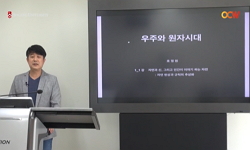This paper seeks to reinterpret the concept of ‘Clinamen’ found in the natural philosophies of Democritus and Epicurus, using Hegel’s notion of self-relational negativity. The article presents the following arguments to achieve this aim: First, ...
http://chineseinput.net/에서 pinyin(병음)방식으로 중국어를 변환할 수 있습니다.
변환된 중국어를 복사하여 사용하시면 됩니다.
- 中文 을 입력하시려면 zhongwen을 입력하시고 space를누르시면됩니다.
- 北京 을 입력하시려면 beijing을 입력하시고 space를 누르시면 됩니다.

자기 관계적 부정성과 대자존재의 유물론 -에피쿠로스를 읽는 두 가지 방식- = “Self-Relational Negativity” and Materialism of “Being-for-self” - Two ways of reading Epicurus -
한글로보기https://www.riss.kr/link?id=A108879730
-
저자
김현 (전남대학교)
- 발행기관
- 학술지명
- 권호사항
-
발행연도
2023
-
작성언어
Korean
-
주제어
Self-relational negativity ; individuals ; plurality ; void ; atoms ; rectilinear motion ; clinamen ; 자기 관계적 부정성 ; 일자 ; 다자 ; 허공 ; 원자 ; 직선운동 ; 편위
-
등재정보
KCI등재
-
자료형태
학술저널
- 발행기관 URL
-
수록면
55-92(38쪽)
- 제공처
-
0
상세조회 -
0
다운로드
부가정보
다국어 초록 (Multilingual Abstract)
This paper seeks to reinterpret the concept of ‘Clinamen’ found in the natural philosophies of Democritus and Epicurus, using Hegel’s notion of self-relational negativity. The article presents the following arguments to achieve this aim: First, it summarizes Hegel’s assessment of ancient atomism and Epicurean philosophy, with a focus on his lectures on the history of philosophy(2). According to Hegel, ancient atomism amalgamates the concepts of Parmenides’ existence and Heraclitus’ non-existence into two principles: atoms and void. It elevates these principles as the spiritual foundation of world constitution, which holds philosophical significance but is constrained by its external and mechanistic perspective on the relationship between atoms and void. The third chapter of this article examines how Hegel’s concept of ‘Being-for-Self’ in his Science of Logic critiques and reconstructs the principles of atomism. This examination delves into the movement of monads or self-relational beings (3). Marx's reinterpretation of Epicurus’ concept of Clinamen in his doctoral thesis, along with its extension and transformation into the creation of abstract self-consciousness, plays a pivotal role in comprehending Marx’s interpretation of Epicurus. The fourth chapter of this article centers its discussion on interpreting Marx’s perspective on Epicurus as the ‘Materialism of Being-for-Self’. To achieve this, the chapter analyzes Marx's concept of ‘Clinamen’ in his doctoral thesis, drawing on Hegel’s notion of self-relational beings. Marx's thesis aims to compare and contrast the atomism of Democritus and Epicurus, reconstructing Epicurus' materialism, which Hegel had devalued, as the dialectic of ‘Freedom and Necessity’ within self-consciousness. Consequently, Marx’s interpretation of Epicurus can be characterized as the ‘Materialism of Being-for-self’, which philosophically inherits Hegel’s dialectical method and transforms it within a materialistic framework (4).
동일학술지(권/호) 다른 논문
-
Immanence of justice (Rechtspflege) Administration in Hegel's Philosophy of Law and its Conflicts
- 한국헤겔학회
- Pablo Moya Pulgar
- 2023
- KCI등재
-
[서평] 초월과 내재의 변증법 ‒ 최신한 교수의 현대의 종교담론과 종교철학의 변형 리뷰 ‒
- 한국헤겔학회
- 정대성
- 2023
- KCI등재
-
개체성과 인정. 헤겔의 자연법 논문의 기획 의도에 관한 한 독해
- 한국헤겔학회
- 이지선
- 2023
- KCI등재
-
셸링의 예술철학과 칸딘스키의 추상예술론 - 음악-회화론을 중심으로 -
- 한국헤겔학회
- 권기환
- 2023
- KCI등재




 KCI
KCI KISS
KISS






